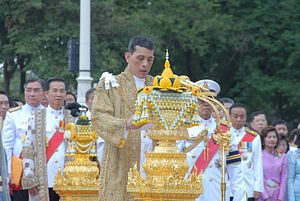On Thursday, news broke that Thailand’s 88-year-old king, Bhumibol Adulyadej, died after suffering complications from hemiodialysis treatment at Bangkok’s Siriraj hospital. King Bhumibol, the world’s longest reigning monarch, was revered as a demi-god and, for most Thai citizens, was the only monarch they had ever known. (For a more detailed profile of Bhumibol’s influence on modern Thailand, see here and here.)
With Bhumibol’s health in question for years, Thai politics has long considered the issue of succession. As I discussed on Sunday, the appointed successor, Crown Prince Maha Vajiralongkorn, is widely unpopular in Thailand, particularly with monarchists. The crown prince’s overseas antics, combined with his perceived soft spot for Thailand’s previous civilian government, leave him a polarizing figure.
However, despite all this, Thai Prime Minister and junta chief Prayut Chan-o-cha, who led the country’s last coup in 2014 to depose the democratically elected government of Yingluck Shinawatra, has strongly suggested that the crown prince would succeed his father, in line with King Bhumibol’s wishes, he had chosen Vajiralongkorn as his heir in 1972. Since the coup, the military-led government has sought to “burnish the reputation of the crown prince,” as the New York Times put it last year.
Prayut himself has regularly conferred with the crown prince, recognizing that a successful and frictionless royal transition is beneficial to continued military leadership and social stability in Thailand. In the final hours of Bhumibol’s life, Prayut held talks with the crown prince, ostensibly to discuss the implementation of a succession plan for the crown. However, an extraordinary National Assembly session on Thursday, following news of Bhumibol’s death, ended without formally inviting the crown prince to step up.
While Prayut has offered some clarity on the “who” question surrounding succession — other potential candidates included the more popular Princess Maha Chakri Sirindhorn and even Privy Council President Prem Tinlasunonda as a temporary caretaker regent — the “when” remains ambiguous. Instead of expediting a speedy succession, Prayut has suggested that Vajiralongkorn “would like to wait for an appropriate time.”
The choice is a curious one and could have been brokered between Prayut, the National Council for Peace and Order (the junta), and the Privy Council over the last year. Given the outpouring of grief for Bhumibol and the declaration of a one-year period of mourning in Thailand, the immediate emplacement of the unpopular crown prince could have amplified social cleavages, possibly even drawing an angry reaction by monarchists who would have preferred to see Princess Maha Chakri Sirindhorn ascend to the throne.
Whatever the strategy might be here for Prayut and Vajiralongkorn, a temporary vacuum could also provide an opening for overt opposition to the planned royal succession to take root. In particular, if the Privy Council still isn’t on board with Vajiralongkorn, the planned succession could grow turbulent.

































